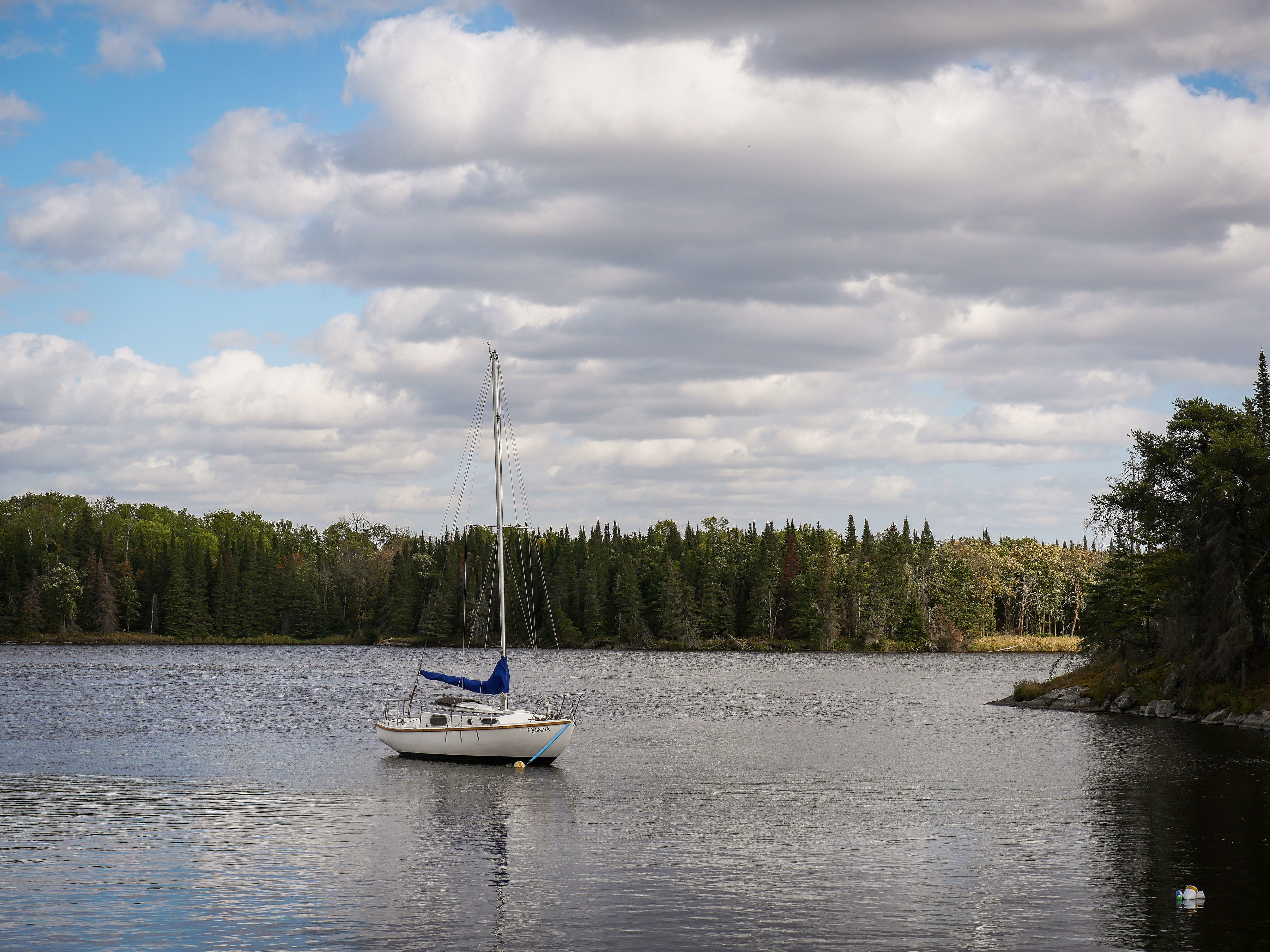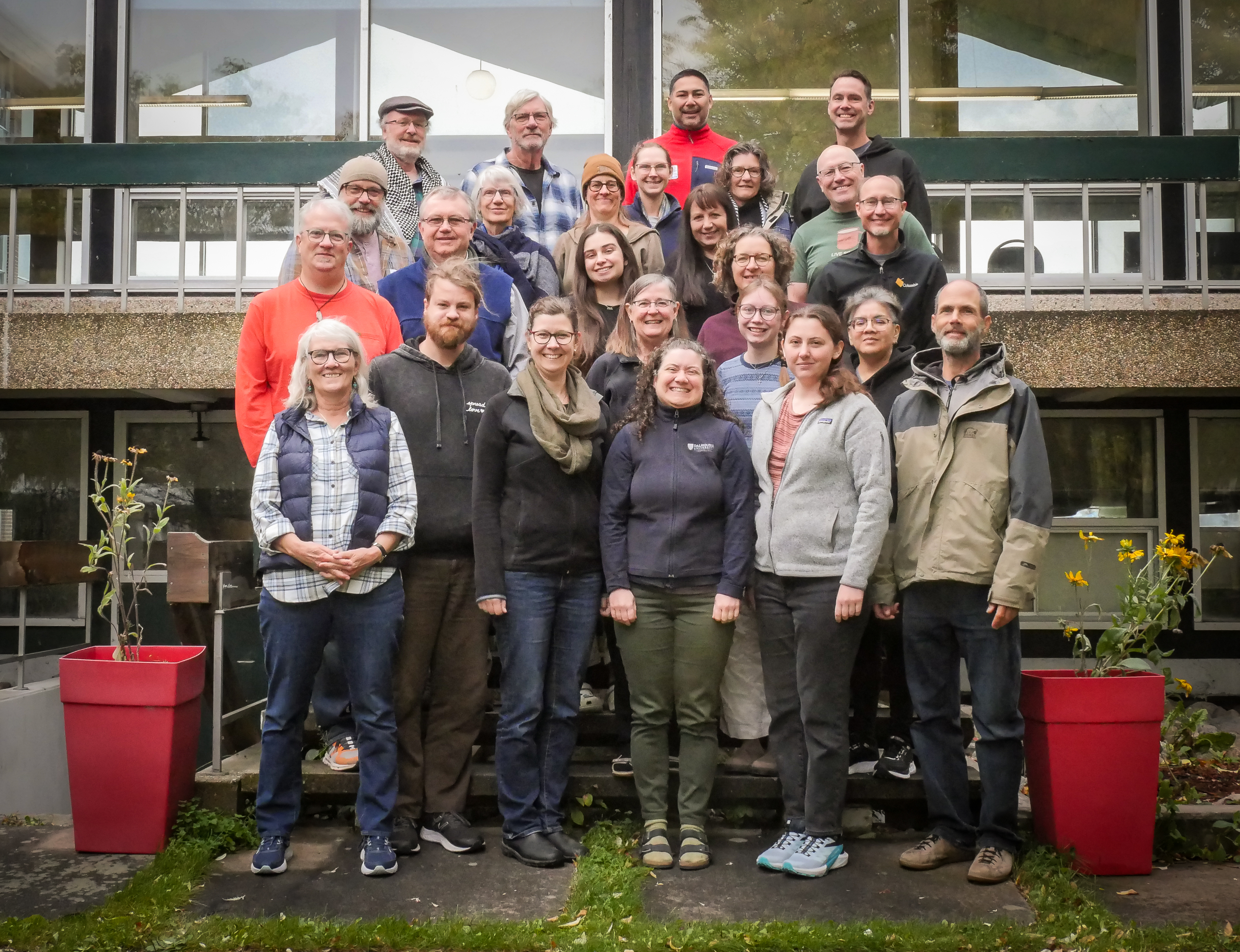December 5th, 2024Climate Action and Indigenous Relations working groups gather
Reconciliation and Climate Action are interwoven, say retreat participants
 Pinawa – Bathing one’s soul in the beauty of lake country on the edge of the Canadian Shield can’t help but invoke wonder. The air feels crisp and clean, and fish still swim and get caught in the nearby Winnipeg River. The area teems with deer, eagles, and black bears.
Pinawa – Bathing one’s soul in the beauty of lake country on the edge of the Canadian Shield can’t help but invoke wonder. The air feels crisp and clean, and fish still swim and get caught in the nearby Winnipeg River. The area teems with deer, eagles, and black bears.
Members from Mennonite Church Canada’s regional climate action and Indigenous relations working groups gathered in picturesque Pinawa, MB for several days of conversation they hope will inspire and ultimately lead to broader awareness and hyper-local uptake of earth-care and Indigenous reconciliation among congregations.
For participant Scott Morton Ninomiya, reconciliation with Indigenous peoples and the addressing the dangers of climate change cannot be separated. Morton Ninomiya’s day job is program coordinator of Indigenous Neighbours for MCC Ontario. When he can, he attends meetings of the Truth and Reconciliation Working Group of Mennonite Church Eastern Canada.
As an undergrad, Morton Ninomiya studied Indigenous relations in the 1990s. “I realized I had no clue about what life was like ‘on the rez,’ as they say.”
It’s taken Morton Ninomiya 30 years for what was “a head issue” and have it “sink to the heart level,” he said of his learning journey to fully grasp that all life comes from the land and water.
Many Indigenous people are generationally closer to the knowledge and experience of living off the land. They have witnessed how harvesting of wild food has dramatically changed in their lifetimes.
“I don’t have to think about land and water that way. I just go to the grocery store,” said Morton Ninomiya.
Ron Flaming helps coordinate Indigenous relations working group activities in the Waterloo region. In an email, Flaming said getting to know an Indigenous colleague “opened my eyes.”
“[I] learned history (in my 60's!) I had not known,” he wrote, citing the Doctrine of Discovery and the nefarious intentions of the residential school system. Flaming cited books and videos that further informed him about reconciliation and climate change (his recommended resource list appears at the end of this story).
Flaming said there is a link between Indigenous relations and climate action, “… in part because Indigenous people of this land tell us that action to heal the climate and environment as a whole is critical.”
How exactly Flaming and his group will bring climate action and reconciliation activities together isn’t yet clear, but he envisions his working group “… catalyzing, inspiring or calling congregations in to learning and action related to Indigenous and climate justice.”
Alberta didn’t have an Indigenous Relations working group until three attendees from that province determined to start one at the Pinawa retreat, said Ruth Bergen Braun.
As a young adult, she spent two months in Manitoba working with what was then called the Native Ministries program.
“Those experiences shaped who I became as a person,” she wrote in an email. “Both before then and since, I’ve had relationships with Indigenous people that became precious to me.” An avid photographer, she has made many friends in Alberta’s Indigenous communities by seeking permission to photograph pow-wows.
“We are still a baby working group,” said Bergen Braun, but she already sees connections with Alberta’s year-old climate action group.
“One advantage of being a small region is we all know each other and some talk has already happened around a dream of having a joint event at Camp Valaqua, one that would include an Indigenous elder and perhaps more Indigenous participation.”
Matthew Wiens is part of Manitoba’s climate action group. For about 12 years, he worked as a climate change specialist with the provincial department of agriculture. “I got deep into the details of climate change and possible responses for the agriculture sector,” but he felt “burnt out” and resigned for family reasons.
For Wiens, the faith perspective and committed people of integrity at the retreat was refreshing.
“The retreat confirmed for me that our relationships with each other, particularly between indigenous folks and those of us who came later, and our relationship with the Earth are one and the same. If we learn how to treat one another with love and respect we will learn how to treat the Earth with love and respect,” Wiens wrote in an email.
Other retreat participants expressed similar sentiments.
Flaming’s faith was essential to the first steps of his learning journey. “Reconciliation is a foundational paradigm for Christian presence in the world,” he said.
Morton Ninomiya has no pretenses about making rapid progress. He quoted the late Murray Sinclair who led the Truth and Reconciliation Commission into residential schools: “Education got us into this, and education will get us out.” The same is true for climate and Indigenous justice, he said.
Morton Ninomiya is fully aware that not everyone moves at the same educational pace. When he visits congregations as part of his Indigenous Neighbours work, he invites listeners to a “listening into action” journey.
“You don’t have to wait for it to sink into your heart to take a step or do an action,” he said.
Ron Flaming’s recommended resources:
- The Valley of the Birdtail by Andrew Stobo Sniderman, Douglas Sanderson
- Walking Together: Intercultural Stories of Love and Acceptance by Edith and Neill von Gunten
- North Wind Man by Clarence Cachagee, Seth Ratzlaff
- Braiding Sweetgrass: Indigenous Wisdom, Scientific Knowledge and the Teachings of Plants by Robin Wall Kimmerer
- Our Long Struggle for Home: The Ipperwash Story by Aazhoodenaang Enjibaajig
- Meeting My Treaty Kin: A Journey Toward Reconciliation by Heather Menzies
- Video: Reserve 107 https://mcc.org/our-stories/reserve-107
- Video: Doctrine of Discovery https://www.youtube.com/watch?v=JvM4SJN76Yg&t=1363s
Photo captions/credits:
Image 1: A sailboat anchored just offshore of Pinawa, Manitoba, showcases the natural beauty of an area that still produces fish and plant life available for harvest. “I don’t have to think about land and water… I just go to the grocery store,” said retreat participant Scott Morton Ninomiya. Photo by Ruth Bergen Braun
Image 2: Representatives of regional climate action and Indigenous reconciliation groups met in Pinawa in November, 2024. They hope that better understanding the link between climate action and reconciliation will help mobilize hyper-local action to heal broken relationships with people and the earth. Photo by Ruth Bergen Braun
-30-